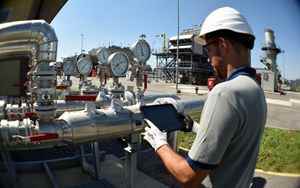(Finance) – Yet another day of increases for the price of gas on the square in Amsterdam, with European governments continuing to take initiatives to replenish stocks and outline plans for decreasing consumption and potential rationing during the winter. The Italian prime minister, Mario Draghi, said the European Commission will present a reflection on how to decouple the cost of electricity from the cost of gas. “This link between the cost of electricity produced with renewables, and therefore water, sun, wind, and the maximum price of gas every day is a link that no longer makes sense”, he said during a speech. at the CL meeting in Rimini.
The price of the contracts TTF gas futures (expiring in September), used by operators as a benchmark for the European market, closed the session with a increase of 8.1% to 290.9 euro / MWh, after reaching 302 euros / MWh just before the end of trading. These are prices that are more than ten times higher than the same period last year.
In June, prices had dropped to 84 euros / MWh, just above the pre-conflict levels, and then started up again on the prospects of a total cut in supplies by Russia. TTF gas prices have become sensitive to any news that is negative. In recent days, for example, they have been prompted by Gazprom’s announcement of the closure of the Nord Stream 1 gas pipeline for maintenance from 31 August to 2 September.
On the European front, the German government approved today a package of measures to ensure energy savings during the winter; if correctly applied, these measures will save gas by 2-2.5%. The Swiss government instead, it has decided to set a voluntary gas savings target of 15%; the decision was taken to avoid a situation of shortage and considering that Switzerland is totally dependent on imports in the gas sector. The United Kingdom for the first time in June it did not import fuel from Russiawhile imports of goods plunged to 33 million pounds, the lowest level since 1997, according to data from the Office for National Statics (ONS).
Draghi recalled that, unlike other European countries, Russian gas supplies to Italy “are less and less significant”, and their possible interruption would have less impact than it would have had in the past. “The filling level of storage has now reached 80%, in line with the goal of reaching 90% by October – he explained – The government has prepared the necessary gas saving plans, with increasing intensity depending on the quantity of gas that could possibly be missing “.
